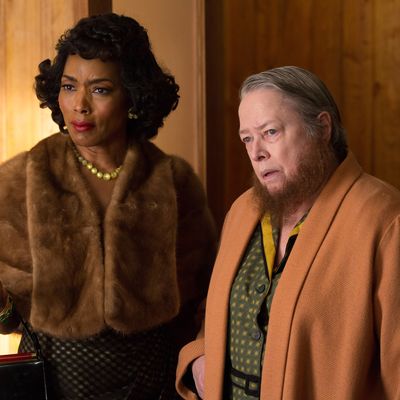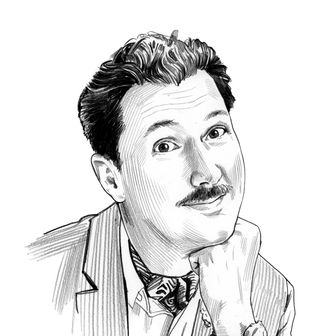
I was having tea with my friend Ben the other day and we were talking about American Horror Story, and he said that there are no great episodes, there are just two great scenes every episode that make you go, “Holy shit, I really love this show.” That is what makes you keep watching, waiting to get your next flash of greatness. And he’s absolutely right. That Ben is a really smart guy.
For me this week, the best scenes were when Dell proved that, for a strongman, he is really ineffective at killing people. Getting absolutely drubbed by Amazon Eve was funny, but the best scene was the whole sequence where Dell and Jimmy are getting drunk in the bar, where Jimmy finally lets his guard down and talks about growing up in the freak show and how the moments he cherished the most are the ones where he could just be normal, where he could be like anyone else. Then, of course, there was the mental image of Ma Petite wearing a rabbit as a shawl that really tickled my funny bone. (That is not at all like tickling Stanley’s funny bone.)
The even better half of the scene was in the alley, when Dell was about to kill Jimmy, who finally confesses that he knows that Dell is his father and gets him to admit it. There was some fine acting by Evan Peters, who finally gets to do something other than moon around with the ladies or play some zombie or whatever he was supposed to be last year.
The other highlights, the things that keep me watching this damn show, included Grace Gummer waking up from her drug-induced coma to see that she’s been turned into a freak by her disapproving father. Wow, I never saw that coming, and the idea of being punished so permanently and extraordinarily is the first truly frightening thing we’ve seen since Twisty died. But really the best moment was Angela Basset in her do-rag, sun shades, and dressing gown, yelling at drunk Dell. That’s the real reason I watch that show.
Luckily, all of what I mentioned above was especially powerful because — damn, do I have a lot of problems with this show. I’m going to go out on a limb here and officially declare this season “not good.” I didn’t think Coven was especially “good” either, but it was fun. I don’t find this very fun, but then there are those moments where I can see the brilliance, the smart critiques of the patriarchy and non-conformists and sexual liberation, and I think, Damn, maybe this is good, but then it’s dashed.
You know what I’m going to harp about first, don’t you? Oh, it’s going to be the anachronistic pop song. Yes, you knew it was going to be. It was back last night, when Jimmy sang Nirvana’s “Come As You Are” to Elsa and a handful of people in the tent. I’m going to get deep into this to show you why it pisses me off so much, so please, come with me on this journey. Come as you are, even.
In the first episode, it was weird when Elsa sang “Life on Mars,” a song that obviously wasn’t around when the action took place. When Bette and Dot sang “Criminal” in the second episode, it clearly set up audience expectations that this was something they were going to do this season and made sense of the initial song. However, it was episode three, where Elsa performed that Lana Del Rey song “Gods and Monsters,” that clearly set up the convention. The audience understood that every episode, someone would perform an anachronistic pop song.
The show was creating a structure by having the songs happen three episodes in a row. If the show wanted to show that, Hey, this is something we’re going to do every now and again, but not every episode, the writers should have deployed the tactic in the first two and not the third, and then done it whenever they wanted, and I wouldn’t have cared. Or maybe the first and third, or first, third, and fourth. You get my point. But they did it three times. That is a trend, as any reporter will tell you. It’s sort of like if you read a poem where, if the first three stanzas had a certain rhyme scheme, you would be looking for it in the fourth, and when it’s not there, it makes the poem seem sloppy. Either that, or it’s like a limerick where no one is from Nantucket.
But no, the songs disappeared for episodes four and five, and then in episode six, Elsa performed a song from the time period when the action takes place. Now, in episode seven, it’s back. So after we got used to it not happening for three episodes, establishing another pattern that the songs were gone, then they’re back. Just poof, out of the ether.
The song also wasn’t used in the same way as the first three. In all four instances, it was an actual performance in the tent, but this was the only time that it came at the top of the episode (which, fine, whatever), and this is the only one that was an establishing montage, catching us up with all the other characters in the show rather than focusing our attention on the performance. Sure, we see Jimmy and Dell leave the tent during “Criminal,” but we were still focused on Bette and Dot for almost the entirety. I know this because I’ve watched these musical clips about a dozen times each. I still really love them and think they are an interesting addition to the show. However, they still infuriate me, because when you’re going to deploy a device as odd as this one, there needs to be some rules.
There are just no rules here. There is no structure. (Again, the episode was 65 minutes last night, adding to the roster of unpredictably fluctuating run times.) Here’s the thing about horror: It’s meant to shock you and take risks, but the only way it can do that is by relying on preset genre conventions and structures. You have to think you know what’s going to happen in order to be surprised by it. Because if we can’t decide on the most simple of things, like how long each episode can be, how are we supposed to be surprised?
American Horror Story sets its own conventions each season, but then it is constantly smashing them. It never gets us complacent enough to really shock us out of our complacency. The show has always been about chaos and excess, which is great, but there needs to be something holding the chaos together. The best free-verse poetry has some sort of inherent structure that it creates itself, or it is busting up structures that the reader already understands. American Horror Story does neither. Its inconsistencies are the ivy taking over the house and tearing down the walls.
The worst part about Jimmy’s song, however, is that it made absolutely no sense whatsoever in the context of the episode or his character. He gets up there and tells Elsa he’ll be performing it at that night’s show. Why? Why does he have this sudden interest in singing? We are given no indication. He has never expressed interest before, and the idea seems to be dropped as soon as he leaves the stage. The only reason we saw Evan Peters sing “Come As You Are” is because Ryan Murphy likes bestowing on him some weird Kurt Cobain realness. It served no purpose in the story and built nothing to establish his character. It was just a little something fun to distract us. If the show needed to cut five minutes to make it to an even 60, I know exactly what should have been cut.
All sorts of characters were behaving in unpredictable ways. Bette and Dot leave Dandy’s without any fuss at all. Wouldn’t Dandy pitch a fit when they left and try to keep them there, or fly into a murderous rage? He at least would have thrown a temper tantrum that would have made Courtney Love looking for the pill she lost look like a lamb. Bette also suddenly sides with her sister, though she was happy with Dandy and thought they were in love, which is what she wants more than anything. Why would she give that up? She always seems intent on making Dot do what she thinks is right — why did she defer to her sister this time?
At one point, when Stanely blackmails Dell into doing his dirty work, Dell gets upset that he has to kill one of the freaks — “one of our own,” he says. Need I remind him that he has treated everyone there like trash, when he arrived just two weeks ago? Stanley responds, “I weep for your sudden sentimentality.” Even he knows it’s bullshit! Dell doesn’t really know these people, and from what we’ve seen, he’s never been really invested in getting to know them or getting them to like him. He’s supposedly spent more time at hustler bars a few towns over than he has trying to find out where Paul the Seal Boy is from.
Speaking of Paul, as much as I loved Grace Gummer’s transformation, where did that come from? Last week we saw her father as a reasonably concerned, typical ‘50s father trying — perhaps forcefully — to make sure his daughter doesn’t make a mistake. She kept talking about how boring and conventional his life is. This week his daughter is talking about how evil he is, and that’s why she wants to leave. Why the change of heart? Then he’s having her disfigured on the couch by his friend with a full face of tattoos so that she can’t possibly hurt his electrician business. Say what? Where did all this come from? Lee Tergesen was never that mean on Oz, and that was one seriously messed-up show.
Finally, Stanley gets his first dead freak to earn him some money. Why he’s incapable of killing someone escapes me. Maybe he doesn’t have the balls for it? (Get it?) Dell goes and kills Ma Petite, and then she is on display at the museum that promised to pay Stanley for new exhibits. Or is she really dead? The last time we saw someone displayed at this museum, it was a fake-out, and we realized that the twins weren’t really dead. Same thing with Ma Petite. The last time she died (when Esmeralda drowned her), she didn’t really die at all. It was a fantasy. So, are we supposed to believe these are real this time? And if we are, are we given any indication that they are real? That is the problem with the fake-out deaths: They are making us question the real thing when they finally happen.
That is the problem with this entire season. There are no rules, no consistency, and people behave in such strange and freakish ways to suit the story week to week. There is no character-building or logic in any of their behaviors. It’s just a mishmash of crazy ideas, none of which I can even excuse because they’re especially creepy or suspenseful. They’re just sloppy, like a family of flies stuck in the cotton-candy machine. But then Angela Bassett shows up in her red dressing-gown and sun shades, and I leap up off my couch and yell, “Yes!” and I’m in for another week.


